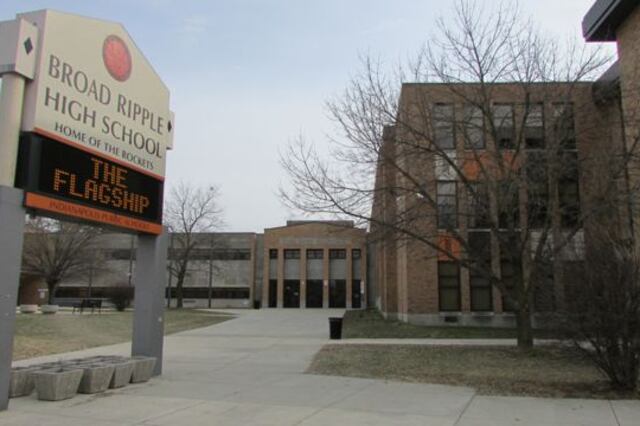Four years after Broad Ripple High School closed its doors, students may return to its classrooms — but just for a year.
Indianapolis Public Schools is considering letting Purdue Polytechnic High School North temporarily use part of the building while the charter school’s permanent home is under construction.
It’s an interesting twist in the saga over Broad Ripple High School. Purdue Poly had sought in 2018 to take over the building but later backed out of the contentious debate that pitted choice-friendly lawmakers against the cash-strapped district.
Selling Broad Ripple High School — a large property ripe for development in a hip neighborhood — would be a boon for IPS. But a controversial state law requires districts to first offer unused properties to charter schools to buy or lease for $1.
IPS has blocked the building from charter school acquisition by keeping Broad Ripple High School in use for office space and athletics, while officials appeal to the legislature to change the law.
“Our concern and our disagreement with the dollar law as currently written, it is prohibitive to the district in being able to have every option available to us in terms of how we leverage that building in the future,” IPS Superintendent Aleesia Johnson said.
Purdue Poly North’s short-term use of Broad Ripple High would come as part of a five-year innovation school agreement being considered by IPS board members this week. IPS is also set to renew its partnership with Purdue Poly’s first high school downtown.
Purdue Poly North, the network’s second campus, needed more space while waiting for its new building on College Avenue to be finished by the summer of 2023, Executive Director Scott Bess said. The charter school would split its more than 300 students between its current space and Broad Ripple High next school year, paying IPS about $260,000 for use and upkeep.
“We weren’t exactly sure what we were going to do had this not happened,” Bess said. “What’s nice is it works out for both of us.”
With plans already in place for a future home, Purdue Poly North would give up any claim under the $1 law to Broad Ripple High School as part of the innovation agreement.
Bess has supported the idea of a legal carveout for IPS from the $1 law, pointing out that few schools are large enough to realistically be able to maintain Broad Ripple High School.
“It makes sense for the community to have something happen to it,” he said. “I think it’s time.”
IPS board members also plan to vote Thursday on another charter school partnership. A new charter school centered on Latino culture could share space in Northwest Middle School for a year — a temporary arrangement while IPS crafts a long-term facilities plan that could lead to renovations or school closures.
Monarca Academy, the charter school, agreed to launch in the fall with just sixth grade, enrolling up to 100 students. Northwest already houses a seventh and eighth grade middle school, in addition to IPS’ Newcomer Program for new immigrants.
Monarca would pay roughly $500 per student for the space.
IPS officials said they see Monarca’s programming as complementary to the Newcomer Program. School founder Francisco Valdiosera, a former IPS administrator, said he hopes his charter school can also attract students from other townships.
Monarca plans to grow to serve grades 6-12, which could provide a high school option for the area since Northwest no longer offers high school grades. Under the IPS agreement, the charter school would have to find a long-term home by January. But Valdiosera is optimistic that the district partnership could open the door to still using an IPS building moving forward.
“My dream would be to be able to stay at the Northwest building,” he said. “As we grow, we could have a high school there as it was before, but it would be Monarca Academy.”





